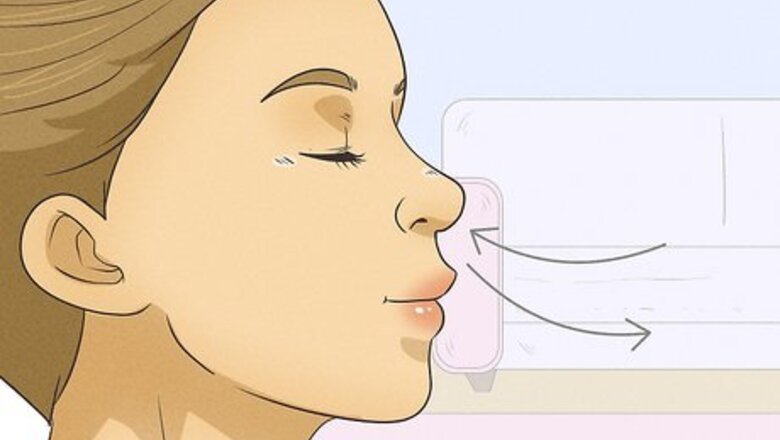
views
Changing Everyday Habits
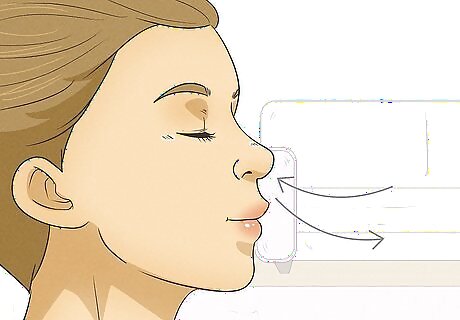
Practice breathing through your nose during the day. If you breathe through your mouth during the day, you may be doing the same during your sleep. To change this habit, be aware of how you breathe throughout the day. If you find yourself breathing through your mouth, close your mouth and try to consciously breathe through your nose.
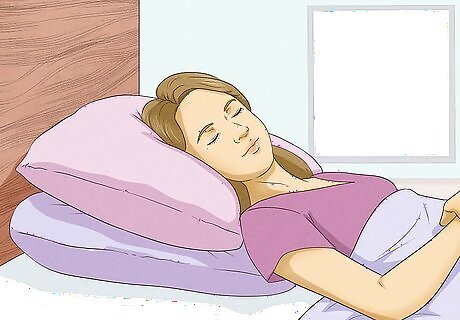
Elevate your head during sleep. Before you go to sleep, put an extra pillow below your head. Raising the height of your head while you sleep may help keep your mouth from opening.
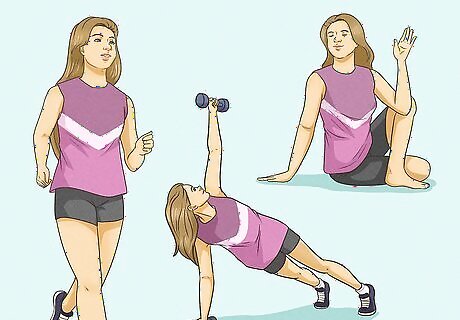
Exercise regularly to change your natural breathing patterns. A daily walk or run will increase your body’s need for oxygen, and your body will naturally respond by taking in air through your nose. Exercising regularly will also help reduce stress, which is itself a cause of mouth breathing. If you do not exercise on a regular basis, making this simple change to your daily routine could help you sleep with your mouth closed. You can also practice yoga or meditation as a way to reduce stress and focus on your breathing.
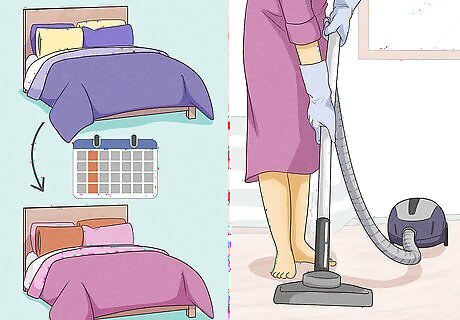
Clean your bedroom regularly to reduce airborne allergens. Dust mites, pet dander, and other airborne allergens may be clogging your nasal passageways during your sleep, forcing you to open your mouth to breathe. To reduce the amount of these allergens in the air, regularly wash your bedding in hot water, vacuum your floors, and dust. Use a vacuum with a fine filter, like a high-efficiency particulate air (HEPA) filter, for best results.
Using a Device
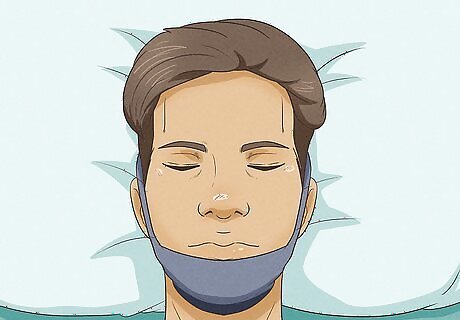
Strap on a chinstrap to hold your mouth closed. A chinstrap is a simple device that may help you keep your mouth closed while you sleep. A chinstrap loops around the top of your head and under your chin, and is usually fastened with Velcro. If you find a chinstrap effective but uncomfortable, stick with it for a while. You may grow accustomed to wearing it with time. A chinstrap may be especially helpful for people who use a nasal-mask-style CPAP machine when they sleep. You can find a chinstrap at most major retailers.
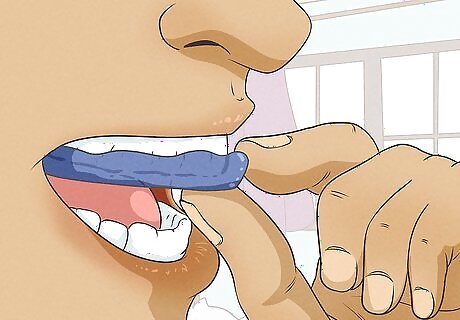
Wear a mouth guard to prevent mouth breathing. Plastic mouth guards designed to prevent mouth breathing, called vestibular shields, are plastic coverings you put in your mouth before sleep. A vestibular shield will force you to breathe through your nose. A mouth guard can also help prevent snoring from the mouth during sleep. Any mouth guard marketed as a device that can help prevent mouth snoring may help. These devices can be found at most pharmacies and large retailers.
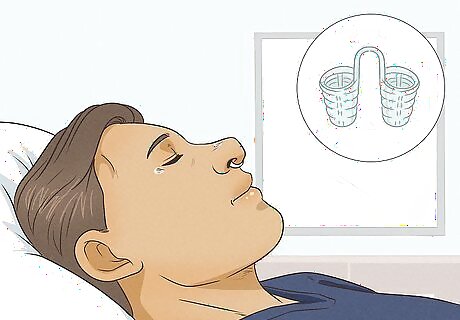
Use a nasal dilator to hold your nose open. You may be sleeping with your mouth open because the airways in your nose are blocked or too narrow, making it difficult for you to breathe through your nose. If this is the case, you can wear a device called a nasal dilator while you sleep to help keep your nose open. You can find these nasal dilators over-the-counter at most pharmacies. There are four different types of nasal dilators: External nasal dilators are placed on the bridge of the nose. Nasal stents are inserted into each nostril. Nasal clips are placed over the nasal septum Septal stimulators put pressure on the nasal septum help open up nasal passages.
Addressing Medical Issues
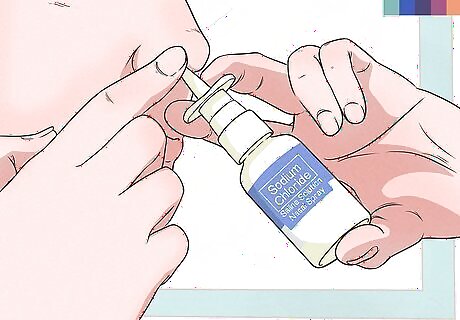
Clear out nasal blockages with a nasal wash or saline spray. You may be breathing through your mouth in your sleep if your nose is blocked, preventing you from breathing through your nose. If this is the case, a nasal wash or saline spray may help you keep your mouth closed by increasing air flow in your nose. A nasal wash would clear your nasal passages of any obstructions, while a saline spray would help reduce any swelling. Nasal saline sprays can be found over-the-counter at your local pharmacy. If you suffer from chronic nasal congestion, an ear, throat, and nose (ENT) specialist may prescribe a stronger steroid spray.
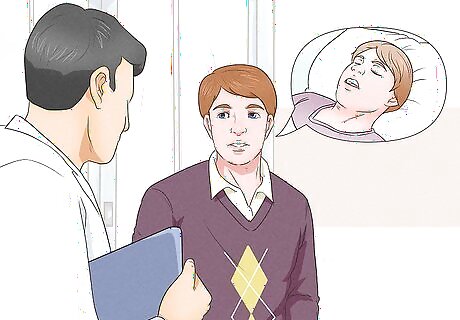
See your doctor if the problem persists. Breathing through your mouth while you sleep may be a sign of an underlying health condition, so if the issues persist, you may want to see your doctor. Keep a record of when you first noticed the issue and any other possible symptoms you are experiencing.
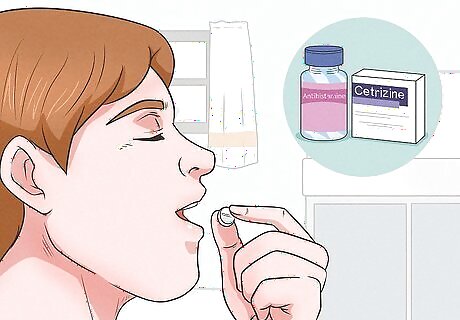
Treat your allergies to clear out your nasal passageways. You may be sleeping with your mouth open if you suffer from nasal allergies. If you believe you may be suffering from allergies, see your doctor about possible treatments. Your doctor will help you identify whatever it is you’re allergic to and will advise you about how to best avoid your allergy triggers. Your doctor may also prescribe an over-the-counter or prescription medication to reduce allergy symptoms.
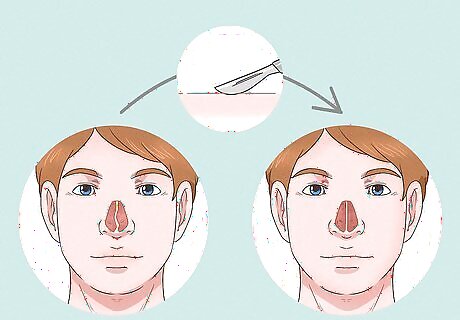
Consider surgery to remove anatomical blockages. A deviated septum could be the reason why you’re sleeping with your mouth open. The nasal septum is the thin wall in your nose that divides the left side from the right. A deviated septum can block one side of your nose and reduce airflow. This can lead you to breathe through your mouth when you sleep. In some cases, surgery is recommended to correct the deviated septum. The surgery to correct a deviated septum is performed by an ear, nose, and throat (ENT) specialist.




















Comments
0 comment